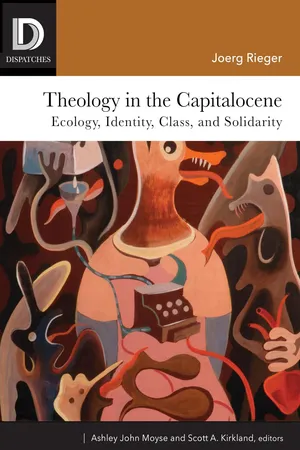
Theology in the Capitalocene
Ecology, Identity, Class, and Solidarity
- 160 pages
- English
- ePUB (mobile friendly)
- Available on iOS & Android
Theology in the Capitalocene
Ecology, Identity, Class, and Solidarity
About this book
In times of rising pressures and catastrophes, people yearn for alternatives. So does the planet. Protests are often a start, but rebellion is not revolution, nor does it always lead to transformation.
In this incisive and compelling new book, Joerg Rieger takes a new look at the things that cause unease and discomfort in our time, leading to the growing destruction and death of people and the planet. Only when these causes are understood, he argues, can real alternatives be developed.
And yet, understanding is only a start. Solidarity, and the willingness to work at the seemingly impossible intersections of everything--the triad of gender, race, and class, yes, but more beyond--must mark the work of theology.
Without solidarities that match the complexities of our world, the best we can hope for is inclusion in the dominant system but hardly the systemic change and liberation we so desperately need.
Frequently asked questions
- Essential is ideal for learners and professionals who enjoy exploring a wide range of subjects. Access the Essential Library with 800,000+ trusted titles and best-sellers across business, personal growth, and the humanities. Includes unlimited reading time and Standard Read Aloud voice.
- Complete: Perfect for advanced learners and researchers needing full, unrestricted access. Unlock 1.4M+ books across hundreds of subjects, including academic and specialized titles. The Complete Plan also includes advanced features like Premium Read Aloud and Research Assistant.
Please note we cannot support devices running on iOS 13 and Android 7 or earlier. Learn more about using the app.
Information
Table of contents
- Cover
- Title Page
- Copyright Page
- Dedication
- Contents
- Introduction: Troubling Intersections in the Capitalocene
- 1. The Peculiar Agency of People and the Planet: Rethinking Religion and Everything Else
- 2. The Immanence and Transcendence of Christianity and Capitalism: Alternatives to Ecological Devastation
- 3. Class and Its Discontents in the Study of Religion and Theology: Reconfiguring Relationships and Power
- 4. The (Im)possibility of Deep Solidarity: Reclaiming Privilege, Power, and Identity
- Conclusions: Solidarity and Reparations
- Acknowledgments
- Selected Bibliography
- Index